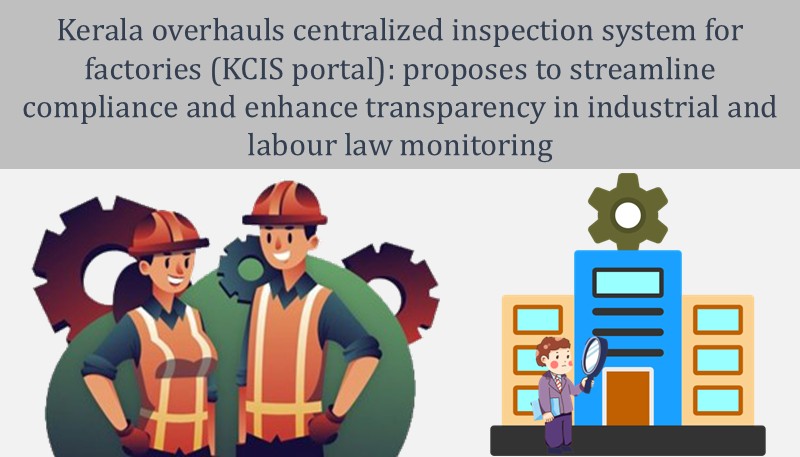Kerala overhauls centralized inspection system for factories (KCIS portal): proposes to streamline compliance and enhance transparency in industrial and labour law monitoring

The Labour Department of Kerala (“Department”) has revised the Kerala Centralized Inspection System (“KCIS”) as part of Business Reform Action Plan 2018-19 under Ease of Doing Business (“EoDB”) initiatives in the State and with a view to improve compliance monitoring under key labour and industrial laws.
Key Highlights:
- Categorization of factories: The factories are classified into High Risk, Medium Risk and Low Risk categories as required under centralized inspection system after considering various risk factors like:
- Hazardous or dangerous manufacturing process;
- Threshold quantity of chemicals in isolated storage;
- Applicable schedules in Factories Act;
- Number of workers;
- History of accidents and dangerous occurrences;
- Safety, health & welfare aspects.
- Frequency of inspection:
- High-Risk Units: Inspected annually or as needed;
- Medium-Risk Units: Inspected once every two years or as needed;
- Low-Risk Units: Inspected once every three years or as needed;
- Categorization of inspections:
- Scheduled mandatory inspections: Conducted per monthly schedules generated on the KCIS portal.
- Emergency Inspections: Triggered by accidents, complaints, judicial directives, or government requests; requiring prior approval from the Director of Factories and Boilers.
- Priority Inspections: Focused on major accident hazard (‘MAH’) category factories, led by senior officials.
- Compliance inspections: Conducted forty-five (45) days after a scheduled inspection, for the purpose of verifying that corrective actions are implemented.
- Surveillance Inspections: For occupational health studies and special projects.
- Inspection of unregistered factories: To identify non-compliant industrial units.
- Digitization and transparency measures:
- Inspectors are required to upload reports and findings within 48 hours post – inspection.
- Factory occupier / authorized personnel are required to be notified in advance for mandatory and priority inspections.
- Surprise inspections allowed only under exceptional circumstances, requiring documentation and justification.
- Surveillance and Inspection Monitoring Committee
Provision for setting up a committee with the following functions:
- oversee the effectiveness of the KCIS system and analyse inspection data.
- conduct sectoral inspections annually.
- evaluates the feasibility of self-certification schemes for compliance efficiency.
The committee will analyse the current mandatory inspections system and its adequacy for meeting the enforcement requirements and provide observations to government as to whether Self certifications schemes need to be considered in the State.
Source: Labour and Skills (D) Department, Kerala